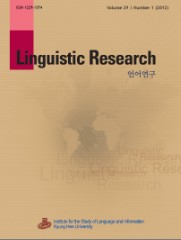- 영문명
- Evaluation and bias in negative yes-no questions
- 발행기관
- 경희대학교 언어정보연구소
- 저자명
- Margarita Dimitrova
- 간행물 정보
- 『언어연구』제39권 제3호, 405~429쪽, 전체 25쪽
- 주제분류
- 인문학 > 언어학
- 파일형태
- 발행일자
- 2022.12.31

국문 초록
영문 초록
The goal of the present work is to discuss the properties of negative yes-no questions capitalising on data from Bulgarian. Negative yes-no questions have traditionally been considered a case of expletive or pleonastic negation, i.e. the negation marker is void of negative content and does not contribute to the negative interpretation of the structure. In view of this property, given languages, like Bulgarian and other Slavic and Balkan languages, display an intriguing blocking of Negative Concord in yes-no questions (Dimitrova 2020a) which prevents the co-occurrence of the negation marker and n-words (Laka 1990). Rather, the negation marker is only compatible with positive indefinites underlying the speaker’s bias towards the positive value of the proposition (Ladd 1981). Considering the data from Bulgarian and building on some intriguing patterns between negative yes-no questions and given types of subjunctive main and embedded clauses (Giannakidou 2016; Dimitrova 2020b), we propose that the negation marker is not expletive but rather contributes to the expression of the speaker’s evaluations and kind of attitude, displaying a relation to the domain of nonveridicality (Giannakidou 1998; Yoon 2011).
목차
1. Introduction
2. On the syntax of negative yes-no questions and the expression of positive bias
3. Bulgarian negative yes-no questions
4. Expletive negation: evaluation and nonveridicality
5. Towards an analysis of negative yes-no questions and expletive negation
6. Conclusion remarks
References
해당간행물 수록 논문
참고문헌
최근 이용한 논문
교보eBook 첫 방문을 환영 합니다!

신규가입 혜택 지급이 완료 되었습니다.
바로 사용 가능한 교보e캐시 1,000원 (유효기간 7일)
지금 바로 교보eBook의 다양한 콘텐츠를 이용해 보세요!



